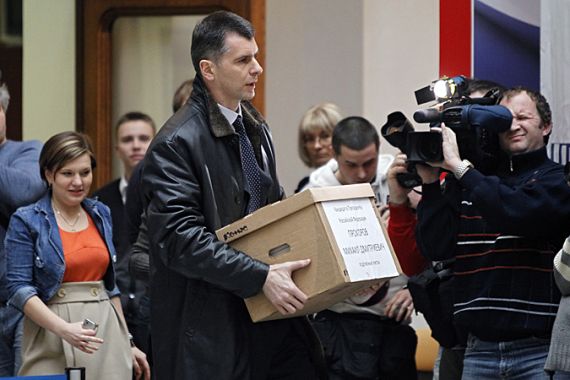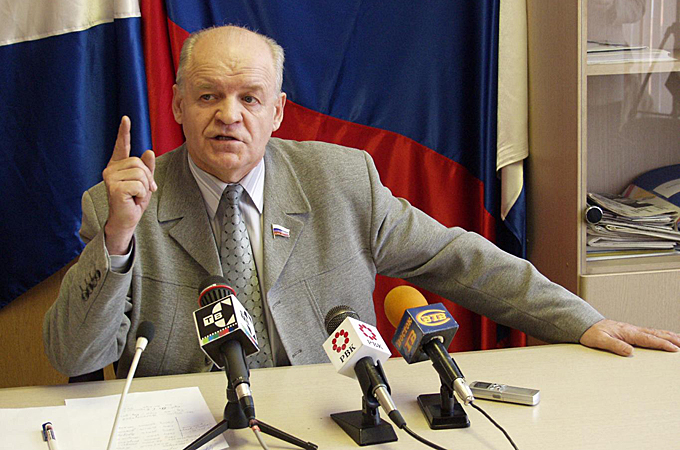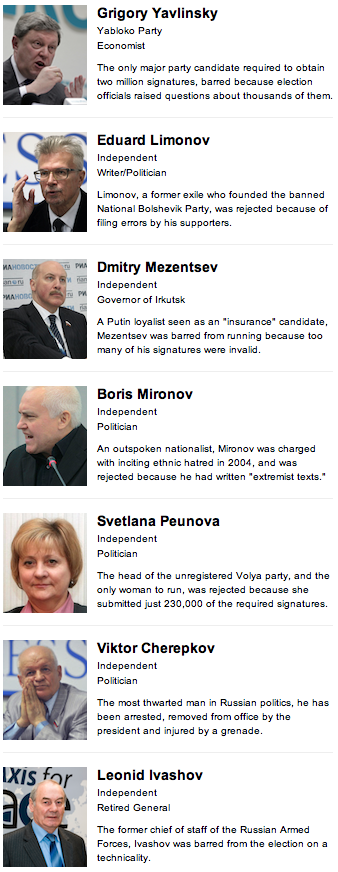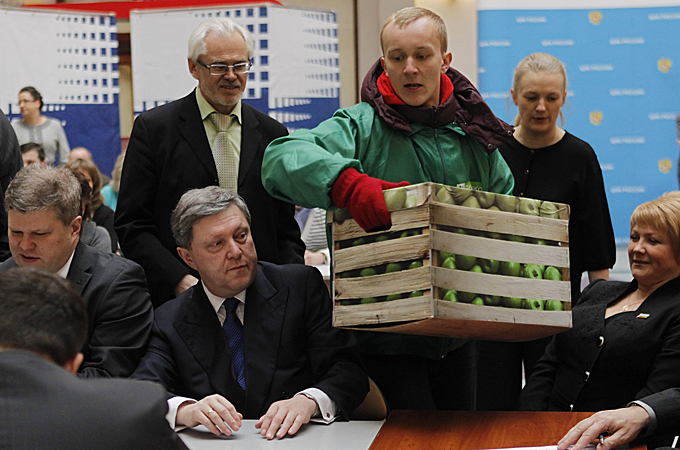How to run for the Russian presidency
Getting one’s name on the ballot sheet for the presidential election is mission impossible for most aspiring candidates.

 |
| Cherepkov has faced considerable barriers in his struggle to participate in public life [image courtesy of Cherepkov] |
Running for Russia’s highest office can be something of an endurance test. Only the fittest, or rather the most compliant, ever make it onto the ballot sheet.
There was a period of relative openness in the immediate post-Soviet era under Boris Yeltsin. Things have become considerably tougher for presidential hopefuls since 2007. Vladimir Putin tightened the conditions, right before he moved from the presidency into a term as prime minister.
Putin is bidding to reclaim the presidency again, after his protege, Dmitry Medvedev, kept the seat warm in the interim.
| Eligibility |
If you want to run for Russian presidency, first you must meet the legal requirements laid out in the Law on Presidential Elections. You must be a Russian citizen and must have resided in Russia for at least the past 10 years.
This ruled out the aspiring independent candidate Nicolai Levashov. Levashov, a writer and self-described healer, has only lived in Russia for six years.
Holding dual citizenship, as does another controversial writer, Eduard Limonov, is another no-no (Limonov had declared that he would surrender his French passport, but the electoral commission refused his candidacy).
A candidate must also have no criminal records at the time of running for the presidency. It is okay, however, if you had a criminal case more than four years ago.
The legal requirements are the easy part, according Grigorii Golosov, a political scientist at the European University at St Petersburg, who argues that the political system that has emerged in the post-Soviet era is nothing more than “electoral authoritarianism”.
“They will interpret the law according to whether or not they want a candidate to run, and will use bureaucracy to block them,” Golosov said.
| Form a political party |
The simplest way to bypass all the bureaucracy is to form a political party that wins seats in the Duma, as Russia’s parliament is known. This is your ticket to automatic candidature, bypassing the most tedious of hurdles. (Four out of the five candidates standing for office were automatic candidates).
Rejected candidates
Only five candidates will run in this year’s election; a far greater number were rejected, including the seven shown below and four others:

In Putin’s era, parties that play the game by the Kremlin’s rulebook are granted the authorisation necessary for them to participate in national political life. Even then, they must have at least seven per cent of the seats in the Duma to have the right to put forward a candidate in the presidential election.
Aside from Putin’s own United Russia party, the only other parties in the elite club under the rule are the Communists, the Liberal Democratic Party and A Just Russia (for more on the difference between systemic and non-systemic opposition in Russia, see Roza Kazan’s article “How to be in opposition in Russia”).
Because they have accepted to provide the illusion of democracy, Golosov says these parties should be considered as an integral part of the political system that allows Russia United to retain its monopoly on power.
One politician whose history as a staunch opposition figure made him a Kremlin outsider is Viktor Cherepkov, the former mayor of the eastern city of Vladivostok.
Cherepkov founded the Freedom and Sovereignty Party in 2001, but since 2007, the authorities have refused to renew its registration.
“With Vladimir Putin’s growing power, his government has devoted itself to supporting the political existence of only those parties it can control,” Cherepkov said.
“Together with Vladimir Putin’s favourite [United Russia], they [the officially recognised political parties] represent a kind of political cartel which have appropriated the monopoly right to form the legislature and the nomination of a candidate for president.”
Dozens of opposition parties have fallen victim to the same ruthless pruning, Golosov said.
There were more than 30 registered political parties until 2006, but only six have managed to hold on to their status. No new political party has been granted authorisation since then, meaning the official political terrain is frozen to the same players that emerged in the early 1990s.
The liberal democratic Yabloko party, one of the handful of the parties to have retained its registration, did not win enough votes in December’s legislative election and consequently, its leader Grigory Yavlinsky didn’t automatically qualify to compete in the presidential vote.
Last year, the European Court of Human Rights ruled that the regulations on political parties were too vague, and refusing to register certain political parties put the Russian authorities in violation of the principle of freedom of assembly and association.
For the many who fail to gain automatic candidacy via a political party, the chances of making it through the next stages are slim …
| Tread carefully |
So you still want to continue with your presidential bid? There are many stumbling blocks that could yet proivde Russia’s Central Election Commission (CEC) with a reason to knock you out of the running.
Hate speech or political rhetoric deemed too revolutionary are grounds for instant rejection. This is a particularly adept tool for excluding popular nationalist candidates like Boris Mironov, the head of the far-right National Sovereignty Party of Russia.
“The authorities have revealed the fact that they are seriously afraid of us, afraid of the Russian people coming to power, armed with the nationalist ideology,” Mironov wrote on his blog in response to the CEC’s decision.
Mironov moved the supreme court to challenge the CEC’s decision, the Ittar-Tass website reported. The court ruled in his favour, on the grounds that the writings judged as “extremist” had been written in 2005, and therefore were not within the four year timeframe. The CEC, however, did not reinstate his candidacy.
Leonid Ivashov, the former Joint Chief of Staff of the Russian Armed Forces, was rejected by the CEC on a more banal technicality. The retired general-colonel had reportedly failed to inform the commission of a political meeting he had held within the required timeframe.
Eduard Limonov, a writer who heads the radical, nationalistic and unregistered Other Russia party, was also denied registration on the grounds of an uncharacteristically mundane technicality.
In Golosov’s view, they were the lucky ones.
“It’s a lot less cruel to spare them early on, before they try to collect the signatures,” the political scientist said.
| Mission impossible? |
Potential candidates who haven’t been eliminated must pass one last challenge if they wish to see their name on the ballot. They must gather two million signatures in support of their candidacy.
The signatures must come from across the country – no more than 50,000 signatures may come from each federal jurisdiction. When Putin tightened the law, he doubled the number of signatures needed whilst halving the length of the period allowed to realise the task.
Only three candidates managed to achieve this fea this time. However the commission rejected two of them, Grigory Yavlinsky and Dmitry Mezentsev, on the grounds that a large percentage of the signatures they had submitted were invalid.
 |
| Yabloko’s Grigory Yavlinsky, second from left, presents boxes of signatures backing his presidential candidacy. The signatures were found to be invalid. [EPA] |
Yavlinsky had sent digital copies of the signatures to Moscow to try to meet the tight deadline, but the law states that all signatures must be handwritten, original copies.
“I am certain that Putin is the person who issued the instruction [for the authorities to reject his application],” Yavlinksy said in comments reported by the AFP news agency.
The only independent candidate who finally made it on to the voting ballot is the billionaire Mikhail Prokhorov.
Svetlana Peunova, who heads the unregistered Volya, managed to collect 243,245 signatures.
She said in a statement on her website that the fact her team of 1,759 volunteers was unable to collect anything close to the necessary two million proves that it is impossible to meet this requirement without committing fraud. Peunova is pushing for an investigation into the signatures collected by the three politicians who claimed to have met this requirement.
“[I]t is impossible to collect two million signatures within 20 days without fraud, just as it is impossible to reach Moscow from St. Petersburg on foot within three hours,” she said in comments reported by RIA Novosti, a Russian press agency.
Golosov agreed, saying: “It’s impossible for any candidate to collect enough signatures, without using digital copies of signatures. It’s deliberately ambiguous so the committee can choose who it accepts, and who it doesn’t.”
Cherepkov, who was unable to collect enough signatures either, said unequivocally that it was impossible to collect the signatures without fraud.
Medvedev has promised to amend this condition in time for the next presidential election. For Cherepkov, this is only the most recent obstacle the Russian authorities have thrown up in his political career. As a politician in Vladivostok, he has encountered eviction, power and phone cuts, a presidential decree removing him from office as mayor, prison and a grenade attack. He says its Russian political culture and not the law that is the problem.